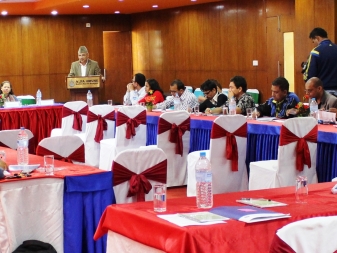Butwal: In order to learn about the kinds of skills, trainings and upskilling interventions required to make the dairy industry more robust, a team comprising representatives of the Ministry of Education, the Council for Technical Education and Vocational Training (CTEVT), UNDP’s Support to Knowledge and Lifelong Learning Skills (SKILLS) project and TVET experts, recently visited an agro farm and research center in Lumbini. For the past few months, the team has been engaged in interacting with and soliciting feedback with a range of stakeholders involved in the TVET sector across Nepal, inputs intended to undertake a review of the existing TVET Policy 2012, and upgrade it according to the current realities of the country’s job market.
At the Lumbini Agro Product and Research Center in Butwal, Rupandehi, owner Shashi Poudel gave the team a tour of the premises, and briefed them on the running of the farm, including key practices and technology employed in growing the business. He also pointed out the challenges of operating animal farms and dairies in Nepal, namely the lack of sufficient students of veterinary and dairy/farm management who would’ve proved vital to enterprises such as his, and the shortcomings of current government policies guiding the same. One point he raised in this regard was the possibility of the government leasing out unused public lands to agri-businesses at minimal charge so as to encourage these to proliferate.
As part of the farm’s research component, Poudel is also offering three-month residential trainings to persons interested in the dairy business, where participants are taught the right ways to care for the animals, milk them as well as handle the relevant equipment. Post-training, most of the participants, Poudel said, have been leaving for countries like New Zealand, Australia and the US to work in dairy farms there.
Besides the dairy, Poudel also recently built one of the biggest bio-gas plants in Nepal. He intends to generate 751 kw of electricity from gobar (cow-dung) gas and use it to light not only the farm, but also sell the surplus to the power grid. He has also been producing compost fertilizer which he uses in his organic farm.
The broader effort on the part of the Government of Nepal and UNDP to revamp Nepal’s TVET policy includes documentation of informal technical trainings provided by farms like the one run by Poudel, expected to aid in the designing of a monitoring and evaluation system for quality assurance and knowledge management of TVET programmes and projects.

